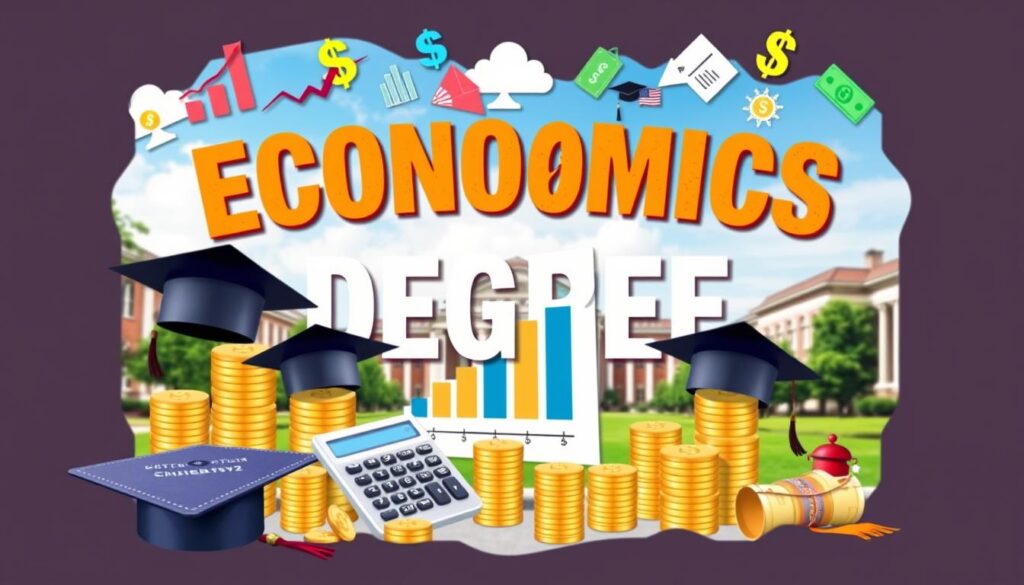Economics is now the #19 most popular major in the U.S. It has 47,809 degrees awarded across 407 schools in 2025. This shows economics is becoming more important for understanding global finance and jobs.
Choosing the right economics bachelor’s degree is key for your future. Top schools like Harvard, University of Chicago, and Columbia are making graduates earn more than average in economics.
When looking at the best econ programs undergrad, think about more than just rankings. The best programs give you both tough classes and real-world economic knowledge. This prepares you for jobs in finance, research, consulting, and public policy.
Key Takeaways
- Economics ranks #19 among undergraduate majors nationwide
- Top universities offer significant salary advantages for economics graduates
- Selecting the right program is crucial for career success
- Economics degrees provide versatile career opportunities
- Academic excellence correlates with higher post-graduation earnings
Understanding Economics Bachelor’s Degrees: Types and Career Prospects
Economics bachelor’s degrees help students understand complex economic systems. They also prepare for many career paths. Students can choose between a Bachelor of Arts (BA) and a Bachelor of Science (BS) in Economics.
Bachelor of Arts vs Bachelor of Science in Economics
The main difference between economics BA programs is their focus. A BA in Economics covers more subjects, like social sciences and humanities. On the other hand, a BS focuses on math and data, for those who like research and analysis.
Career Opportunities and Salary Potential
| Career Path | Average Starting Salary | Typical Employers |
|---|---|---|
| Financial Analyst | $65,000 | Banks, Investment Firms |
| Economic Consultant | $70,000 | Consulting Firms |
| Market Research Analyst | $63,000 | Corporate Research Departments |
Graduates with economics degrees have many career options. Potential employers include government agencies and private companies. They offer good salaries and chances for growth.
Industry Demand and Growth
The need for economics experts is growing. This is because of globalization and the complexity of economic systems. Students with economics degrees are ready for jobs in data analysis, policy making, and strategic planning in different fields.
Best Econ Programs Undergrad: Elite Institutions Leading the Way
Top universities lead in economics education. They offer tough courses and research chances. This makes them stand out.
For 35 years, research has shown the best economics programs. It looks at professors’ work in top journals. The American Economic Association’s EconLit database helps track this.
| University | Ranking Strength | Key Research Focus |
|---|---|---|
| University of Chicago | Consistently Top 5 | Behavioral Economics |
| Northwestern University | Strong Publication Record | Quantitative Economic Analysis |
| University of Pennsylvania | Innovative Research | Public Policy Economics |
| Vanderbilt University | Emerging Powerhouse | International Economic Development |
| Columbia University | Urban Economic Studies | Financial Economics |
Students looking for top economics programs should find ones with academic rigor and research chances. These schools lead to great jobs in economics, policy, and finance.
Now, top programs focus more on skills like computing and data analysis. This gets students ready for today’s economic world.
Key Features of Top Economics Programs
Choosing the right undergraduate economics major is important. Look for programs that offer more than just classroom learning. The best ones give you a full experience.
Faculty Expertise and Research Opportunities
Great economics programs have top-notch professors. These experts share their latest research and insights with students. At places like Harvard and Stanford, you learn from leaders in economics.
Curriculum Structure and Specializations
Top programs let you shape your own path. You can focus on international economics, econometrics, or behavioral economics. This way, you can match your studies with your career dreams.
| Program Feature | Typical Offering |
|---|---|
| Credit Requirements | 120 credits |
| Specialization Options | 3-5 focused tracks |
| Research Opportunities | Undergraduate research grants |
Internship and Industry Connections
Getting hands-on experience is key in economics. Top schools have strong ties with the industry. This means you can get internships that help you grow professionally.
Economics graduates often see a big salary boost. A good undergraduate program can really help your career.
Admission Requirements and Application Process

To get into top economics programs, you need to prepare well. Students aiming for the best programs must show they’re ready for economic studies. They must meet certain academic standards.
Admission criteria include several important parts. Most top programs look for:
- Minimum GPA of 2.0-3.0
- Prerequisite coursework in mathematics and economics
- Standardized test scores
- Comprehensive application packet
Prerequisite courses are key. Students should take intro classes in microeconomics, macroeconomics, and statistics before applying. Many universities expect applicants to keep high grades in these classes.
Application deadlines vary. Most top programs have specific dates:
| Admission Type | Deadline | Notification Period |
|---|---|---|
| Early Decision | November 1 | Early April |
| Regular Decision | January 2 | Mid-June |
International students need more documents. They must show English language skills with tests like TOEFL (100), IELTS (7.5), and others. The application process is tough, looking at grades, activities, and research potential.
Students should make a detailed application. It should show their academic success, research interests, and dedication to economics. Showing passion for learning is valued by many programs.
Core Curriculum and Course Offerings
Looking into top econ bachelor’s programs shows a detailed and tough curriculum. It’s made to get students ready for big economic challenges. The learning goes beyond just sitting in class. It dives deep into economic ideas and how to analyze them.
Essential Economics Courses
Students in these programs follow a set of key courses. They learn about microeconomics, macroeconomics, and stats. These classes give them important insights into economic theories and how to do research.
Advanced Mathematical Components
Being good at math is key in studying economics. Students learn advanced calculus, linear algebra, and econometrics. These skills help them do deeper economic analysis and make predictions.
| Course Category | Total Courses | Credit Units |
|---|---|---|
| Microeconomics Courses | 12 | 4 |
| Macroeconomics Courses | 8 | 4 |
| Game Theory Courses | 2 | 4 |
| Data Analytics Courses | 1 | 4 |
Specialized Electives
Top economics programs offer special electives. Students can dive into niche areas like behavioral economics and international development. These courses let students focus on specific areas of economics.
The wide range of courses makes sure graduates are ready for many jobs. They have the skills to analyze, understand, and apply economic knowledge.
Cost Considerations and Financial Aid Options

Getting an economics bachelor’s degree needs careful money planning. The cost can be from $24,000 to $79,200 for 120 credits. Prices for credits vary from $200 to $660, based on the school.
Students looking at an economics degree should know the financial details. Public schools are usually cheaper than private ones. Tuition for in-state students can cut down costs a lot.
| Institution Type | Average Annual Cost | Financial Aid Potential |
|---|---|---|
| Public Universities | $9,400 | High |
| Private Nonprofit | $37,600 | Moderate to High |
| Private For-Profit | $18,200 | Low |
Financial aid can help with the cost of an economics degree. Federal Pell Grants can be up to $7,395 a year. Work-study programs and scholarships also help, making it easier to pay for school.
Smart planning like applying for many scholarships and keeping good grades can help. Many top schools now don’t require loans for students from lower-income families.
Program Formats and Learning Options
Looking into the best colleges for economics shows a wide range of learning chances. Students can pick from many program types that fit their learning style and life situation. The old-school on-campus learning is still popular, but new ways of learning economics are also changing the game.
Online and hybrid programs are becoming more popular. The National Center for Education Statistics says 44% of four-year public school students took all their classes online in the fall of 2020. These flexible options make top economics education available to more students, especially those who can’t make it to campus.
| Program Format | Key Characteristics | Ideal For |
|---|---|---|
| Traditional On-Campus | Direct faculty interaction, campus resources | Full-time students, traditional learners |
| Online Programs | Flexible scheduling, remote learning | Working professionals, geographic constraints |
| Hybrid Programs | Blend of online and in-person instruction | Balanced learning approach |
Many top colleges for economics now have fast-track programs and combined bachelor’s/master’s degrees. These new paths let students finish their studies quicker and get more advanced skills. Specialized certificate programs in fields like international economics and quantitative methods offer more chances for deep learning.
Students should think about what they prefer to learn, their career goals, and how much time they have. Each learning style has its own benefits. This way, future economists can find the best fit for their needs.
Conclusion
Choosing the best econ programs undergrad needs careful thought. Schools like Harvard, Stanford, and MIT offer top economics education. They prepare students for tough analytical tasks.
These programs give more than just knowledge. They help students find careers in finance, research, and business.
Economics education opens doors for eager students. Getting into top schools like these is tough. You need great grades and a good plan.
These programs do more than teach. They help students think critically, solve problems, and understand the world economy.
When picking a program, look at the teachers, research chances, and alumni connections. Schools like Princeton and University of Chicago show the power of good economics education. Their graduates work in many fields, like economic consulting and finance.
Choosing an economics program is a big step for your future. Focus on doing well in school, getting research experience, and learning a lot. This way, you can make a big impact in the world economy.



